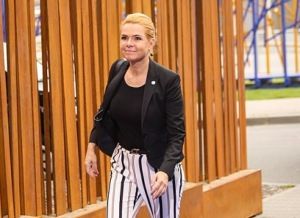News
Banish them to an uninhabited island, suggest DF
This article is more than 8 years old.
Dansk Folkeparti (DF) has resurrected a novel idea for dealing with rejected asylum-seekers as part of the negotiations on next year’s finance bill

Inger Støjberg is all ears when it comes to new ideas to control asylum-seekers (photo: Arno Mikkor, Aron Urb)
What do asylum-seekers have to do with budgets, you may ask. Not a lot – unless you are from Dansk Folkeparti and are negotiating with the government over next year’s Finance Bill, it seems.
READ ALSO: Thousands expelled from Denmark in past year
One of the suggestions again put forward by the party as part of the price for its support is to place asylum-seekers whose applications have been rejected on one of the 300 uninhabited islands around Denmark while they are waiting to be deported, reports TV2 Nyheder.
A latter-day Count of Monte Cristo?
Last time the idea did not garner much support but now the minister for immigration and integration, Inger Støjberg, is not so dismissive – although she does admit there could be practical difficulties.
“I’m always willing to take a closer look at good ideas as to how we can improve our control over rejected asylum-seekers, and that naturally applies to suggestions from Dansk Folkeparti,” she told Berlingske.
“There might be some practical and legal challenges in establishing a deportation centre on a very isolated spot, and these are things that have to be considered,” she added.
One of the problems might be that the deportation process is often rapid and it could be difficult if the deportee is on an isolated island.
It could also be very costly to establish the centres, and the process might be construed as depriving people of their liberty, which might be problematic in relation to the Convention on Human Rights.
Plenty of fresh sea air, at least!
As of the beginning of September, there were 921 people awaiting deportation and almost half were not imminently scheduled to be deported. A number of these live at Kærshovedgård, a deportation centre near Ikast that was formerly a prison. Local people have complained that they feel insecure and about shoplifting by inmates from the centre, and DF think its idea would solve the problem.
“In Denmark, we have around 300 uninhabited islands and if Inger Støjberg really is open to our suggestion, she could ask her civil servants to investigate how it could be done,” said Martin Henriksen, the immigration affairs spokesperson for DF.
He also believes it would not necessarily be expensive: “Maybe we can find an island that has some buildings on it already, but if not, the centre could be made up of anything: from containers for people to live in, or tents.”










































